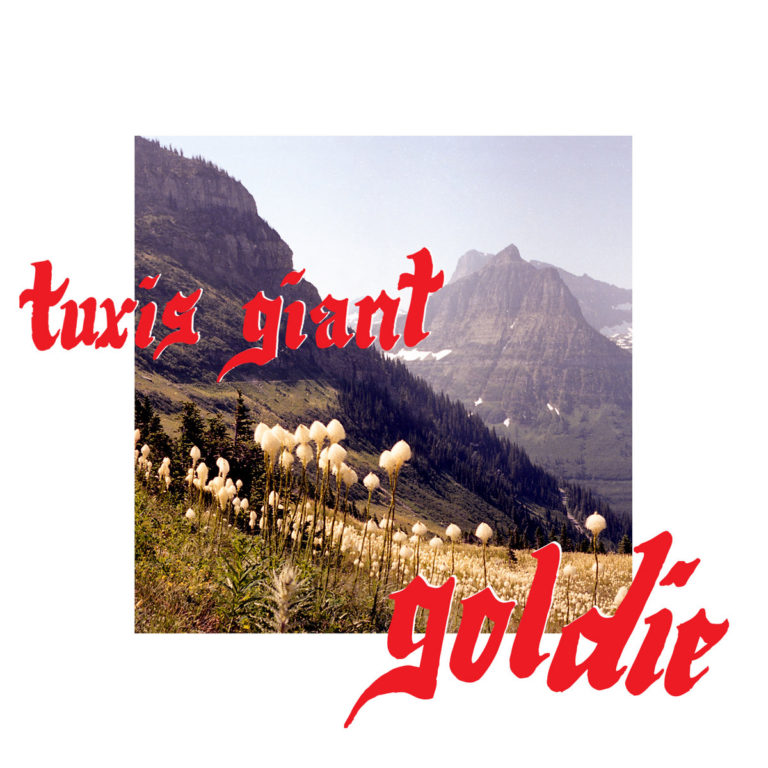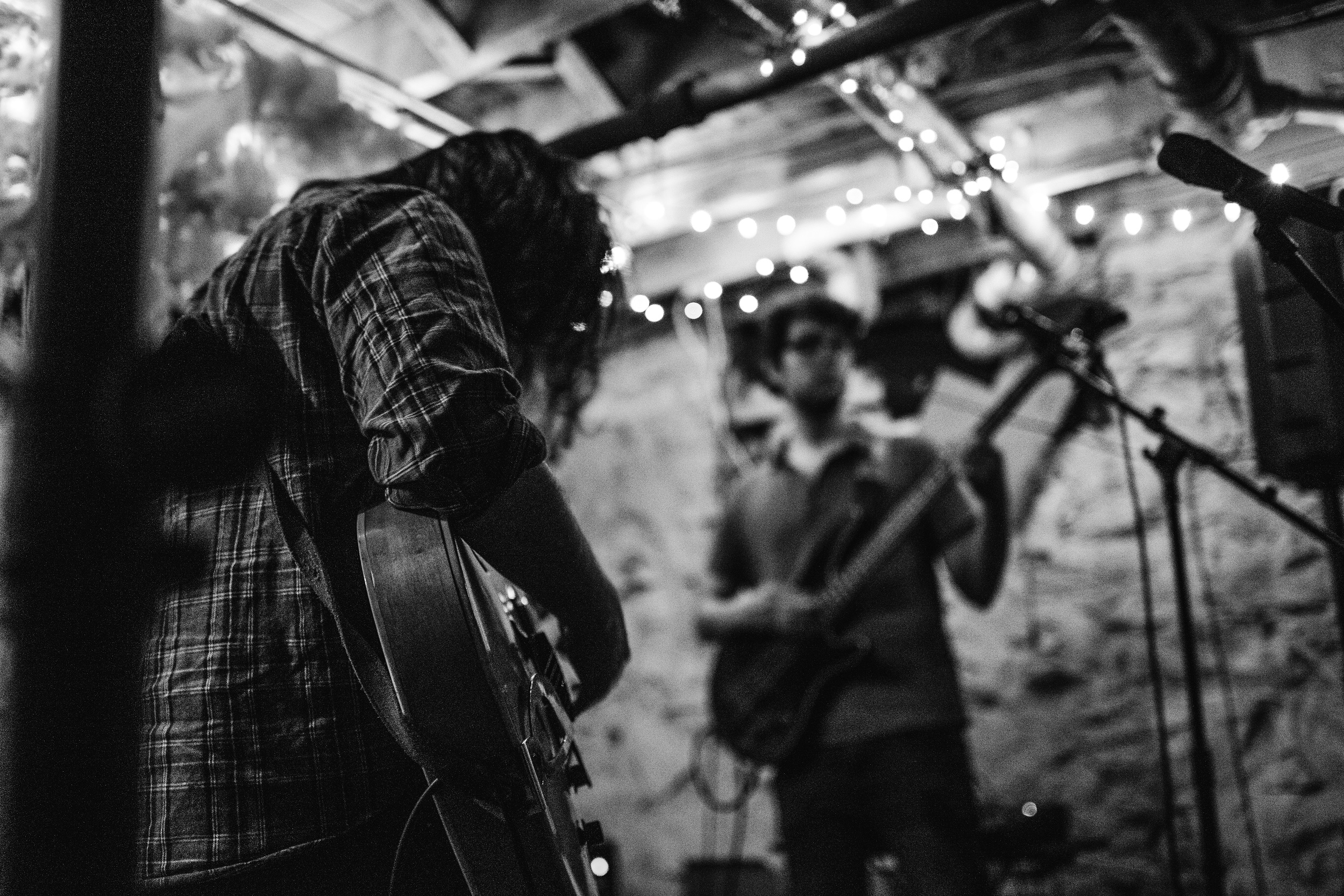Originating as the solo project of Matt O’Connor in 2013, Boston’s Tuxis Giant evolved gradually, eventually becoming a full band for 2018’s Here Comes the Wolf. After the hushed intimacy of the self-titled debut record, the album was a clear pivot in style, crafting a cavernous sound that blended stark melancholy with big echoing crescendos. Now, along with band mates James Steinberg and Ted Chafizadeh, as well as added violin from Will Henriksen, O’Connor is back with Goldie, the third full-length Tuxis Giant album, which sees the evolution continue.
“After Here Comes the Wolf, we wanted to make something a little more focused and tactile,” O’Connor explains. “HCTW was a long record with big, spacious arrangements. It was recorded in a warehouse space with lots of natural reverb, which let us really lean into that sprawling feel. We wanted to reign all that in with Goldie.” Written in 2018 and recorded at home in the basement, the new album possesses a different energy altogether. “We wanted to make it feel it intimate and hemmed-in. Close and present, like you’re in the room with us.”
Goldie is ostensibly a record about a failing relationship, though the framing serves a wider context, delving into questions of meaning, purpose and self-image in the twenty-first century. “A lot of the songs are about being stuck between contradictory feelings,” O’Connor says. “Getting enthralled by daydreams while your life slips by; giving everything to a relationship that’s destroying you; trying to believe in the healing process, even if it still hurts.” The question as to whether remain in a relationship stands in for larger questions, and in doing so allows Tuxis Giant to probe the gap between what we are and what we feel we should be.
Opener ‘Townie’ presents a narrator out of sync with their surroundings, or rather in surroundings gradually becoming out of sync with them, the outside world in some mismatched timeline running parallel to their own life. The country-inflected wistfulness is born of such a space, the sense of watching time pass and everything change, even that around which one’s identity is crafted. “I spent my early/mid twenties deeply involved in Boston’s music scene,” O’Connor explains. “Going to tons of shows, running a house venue, touring whenever I could. But after a while, I started feeling distant from that life. My neighborhood kept changing, venues shut down, bands broke up, friends moved away.”
If there is sadness in the song then there’s certainly fondness too, the realisation that not only does nothing last, but that the intrinsic beauty of things relies on the fact. Such an emotion underpins much of Goldie, a kind of gentle grief that is glad too. But running against this is a sense of unease, a nagging feeling that things shouldn’t be this way, that time is running out. “I’m singing in the basement, getting older,” O’Connor sings on ‘Frog Judy’. “What happens when it’s over? / feeling stupid… I can’t live in dreams forever.”
If this mood is facet of the human condition, then it is one the millennial generation have taken to heart. A cohort that feels childish in front of what is expected of them, their every waking moment subconsciously or otherwise judged on some scale of productivity. The guilt of being oneself. When O’Connor sings about not being able to live in dreams forever, the sense is that they feel to the need to ‘grow up’, to leave the fantasies of the young and enter the ‘real world’. But what if the irony of our time is that the expectations are the fantasy? The ‘real world’ not real at all?
To consider this is to let go of the guilt. To ‘start living’ not through some upheaval of your life but an immersion within it. To give credence to your own experience and circumstances. The motif of coming to terms with things, of recovering, crops up across Goldie. ‘Healing’ finds solace in the fact that bad things happen, that “everybody gets fucked sometimes,” while ‘Bethlehem’ passes this kindness on to another. “Let me in the bathroom,” O’Connor sings, “I’ll clean your cuts / no one will notice,” the track edging forward with morose quiet until taking a noisy leap in its closing segment and unleashing a kind of a cathartic release.
Closer ‘Take a Little Time’ might be more subdued in sound, but its sentiment finds Tuxis Giant at their most powerful. “On this record especially, we decided to move away from the huge explosions of distortion and big dramatic displays,” O’Connor says, “opting for more measured and subdued moments. Those explosions are still there, but sometimes the most effective thing to do is be quiet.”
Again the track concerns a relationship on the surface, an earnest expression of the confusion and longing that have come to mark the love at hand. But it could also be read a different way. What if, rather than speaking to another, O’Connor is addressing themselves? Their pleas not an attempt to cling on to what they have, but rather shake free of what they do not. “Take a little time,” they sing, “then, I don’t know / you may find a part of you / that won’t leave this behind.” Perhaps the answer is to appreciate the moment, your own life. To not betray yourself so badly as to mark it all up as idle dreaming.
We’re delighted to be able to share the album in its entirety today, so do yourself a favour and take an hour to step into the world of Tuxis Giant:
Album art by photo by Brad Ziegler, Boy Nirvana and Louis Roe / Photos by Omari Spears




